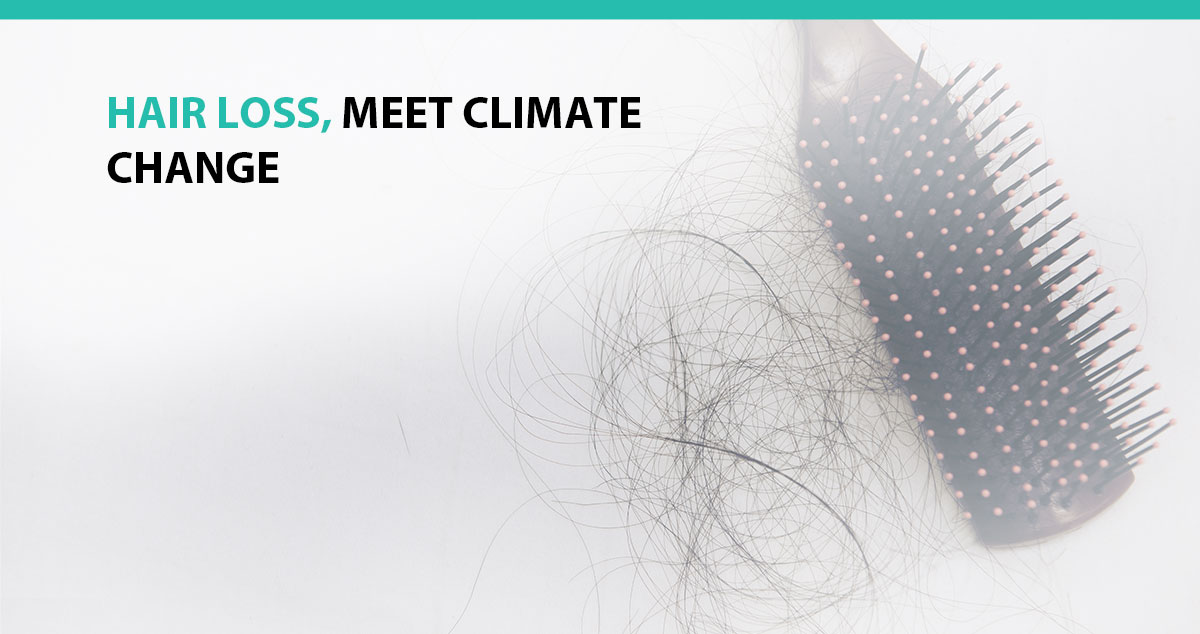
Talk of climate change is everywhere these days, especially since we just hit the hottest month on record. It is a pressing global issue with far-reaching consequences, affecting various aspects of our lives. Beyond its well-documented environmental impacts, recent studies have explored potential connections between climate change and human health, revealing unexpected associations, such as hair loss.
We’ll cover the link between hair loss and climate change, drawing on scientific research and highlighting the complex interplay between environmental factors, physiological responses, and lifestyle changes. Here’s a brief look at several topics, ordered from most studied to least studied in the context of the relationship between hair loss and climate change:
- Overview
Genetic factors have been shown to play the most significant role in hair loss, but environmental factors can also contribute. Hair loss is characterized by a disruption in the natural hair growth cycle, leading to thinning or balding. New and existing research helps set the foundation for understanding how factors related to climate change might impact hair health. While hair loss is our main focus here at Advanced Medical Hair Institute, we do not want to diminish the more threatening health concerns resulting from climate-related factors, such as heat-related illnesses, respiratory problems, and mental health issues.
- Environmental Factors
Is there a correlation between external environmental factors and the health of hair follicles? Factors such as pollution, UV radiation, humidity, and temperature changes can influence the condition of the scalp and the growth of hair. Research examines how these factors can lead to inflammation, oxidative stress, and other physiological changes that contribute to hair loss.
- UV Radiation
It’s hard to miss all the discussion and articles of the effects of increased UV radiation resulting from climate change. Ultraviolet radiation can damage the structure of hair strands, leading to breakage and hair loss. Moreover, prolonged exposure to UV radiation may impact the cellular processes within hair follicles, affecting their ability to produce healthy hair.
- Air Pollution
As climate change intensifies, air pollution is a growing concern in many regions. Particulate matter, volatile organic compounds (VOCs), and other pollutants can deposit on the scalp, potentially causing inflammation and disrupting hair growth. Studies have linked air pollution to an increased risk of hair loss and premature greying.
- Mental Health
What about the psychological toll of stressors related to climate change? Natural disasters, displacement, and eco-fear can trigger chronic stress and anxiety, which are linked to conditions like telogen effluvium. Stress hormones have also been shown to have a great impact on the hair growth cycle.
- Extreme Weather Events
There is a complex relationship between extreme weather events and hair health. Climate change leads to more frequent and severe extreme weather events, which can have direct and indirect effects on hair health. Disasters such as hurricanes, floods, and wildfires can lead to stress, malnutrition, and exposure to harmful elements, all of which are contributors to the problem, per emerging research.
- Nutritional Impact
Changes in agricultural practices due to climate change can affect the crop yield and nutritional content of food. Reduced nutrient intake can lead to micronutrient deficiencies in vitamins and minerals that are essential for hair health. Research investigates how shifts in dietary patterns influence overall health, including hair quality.
- Water Scarcity
How do inadequate water resources affect hair health and maintenance? Water makes up around 25% of the hair shaft, making it just as essential to hair health as proper nutrition. Long-term dehydration causes your body to prioritize how it will use the little water it receives. It reroutes this valuable nutrient from your skin, nails, and hair, committing it to more vital body organs. Climate change has a direct effect on the amount of readily available water for intake and for hygiene/sanitation. And limited access to clean water can lead to scalp issues and contribute to hair loss.
- Lifestyle Changes
Climate change can only be dealt with successfully but doing what humans have always done – adapting in order to survive. This may eventually lead to taking a closer look at our practices and behaviors, and then making adjustments. Higher temperatures from climate change usually lead to an increase in the use of air conditioning, which in turn may make the problem worse because they release harmful gasses into the air. When it comes to hair though, we may find ourselves rewriting the rules of best grooming practices to help the environment and resuscitate our hair health.
As I mentioned above, we just completed the hottest month in recorded history (July 2023). What strategies will we come up with (as a nation or as a people) to mitigate the larger implications of climate change on human health, including hair loss? How do we play a part in reducing its intensity, while enhancing our own human resilience?
While the link between hair loss and climate change is complex and multifaceted, emerging scientific evidence suggests that environmental factors associated with climate change can impact hair health and contribute to hair loss. UV radiation, air pollution, extreme weather events, nutritional changes, water scarcity, and climate-induced stressors are all potential culprits. Deepening our understanding about this connection is vital for survival and even for seemingly cosmetic reasons such as the appearance of our hair and its health.
Contact Dr. Joseph Williams to gain further insights on how to slow down thinning or balding hair from the onset of the first warning signs.










